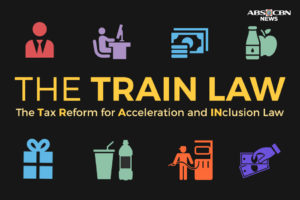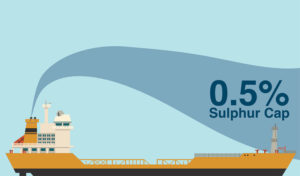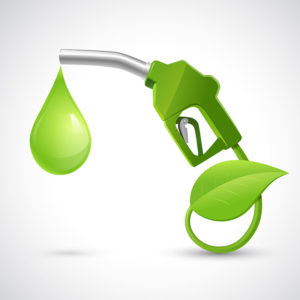 Enacted into Law on 19 December 2017 and took effect 01 January 2018, the Tax Reform for Acceleration and Inclusion (TRAIN Act) generally, was established to generate revenue to achieve the vision of the Duterte Administration for the country including eradication of poverty, create inclusive economic environments to open equal opportunities, achieve higher income country status and pave the way for simpler, fairer and efficient tax system.
Enacted into Law on 19 December 2017 and took effect 01 January 2018, the Tax Reform for Acceleration and Inclusion (TRAIN Act) generally, was established to generate revenue to achieve the vision of the Duterte Administration for the country including eradication of poverty, create inclusive economic environments to open equal opportunities, achieve higher income country status and pave the way for simpler, fairer and efficient tax system.
Being the first of four packages of tax reforms to the National Internal Revenue Code of 1997 (Tax Code), some modifications introduced in the package includes changes in the personal income tax (PIT), estate tax, donor’s tax, value added tax (VAT), documentary stamp tax (DST) and the excise tax of tobacco products, petroleum products, mineral products, automobiles, sweetened beverages and cosmetic procedures.
The TRAIN Act imposes excise tax on downstream oil industry including LPG, diesel fuel and premium gasoline (regular and unleaded) with a total increased amount per liter of P3.00, P6.00 and P10.00 respectively, implemented in three tranches from 2018, 2019 and 2020. The translated incremental increase on excise tax per product from 2018, 2019 and 2020 is presented in Table below.
| Prior to 2018 | 1st Tranche 2018 |
2nd Tranche 2019 |
3rd Tranche 2020 |
Total Excise Taxes | |
| LPG | 0 | +1.00 | +1.00 | +1.00 | +3.00 |
| Diesel | 0 | +2.50 | +2.00 | +1.50 | +6.00 |
| MOGAS | 4.35 | +2.65 | +2.00 | +1.00 | +10.00 |
In 2018 alone, excise tax per liter for specific fuel products is priced for LPG (P1.00), bunker fuels (P2.50), Diesel (P2.50), Petcoke (P2.50), Kerosene (P3.00), Avgas (P4.00), gasoline (P7.00), naphtha (P7.00), asphalt (P8.00), lubricating oil (P8.00), paraffin wax (P8.00) and refined fuels (P8.00).
The Philippine Institute of Petroleum (PIP) supports the government’s infrastructure program to sustain inclusive economic growth and investments in the social capital and likewise recognizes the inflationary impact of high fuel prices as traders readily blame the fuel price hike as reason for increase in prices of prime commodities. This given the fact that BSP has estimated that out of 6.7% inflation hike, only 0.7% point is attributable to TRAIN and fuel only accounts for 0.4% point.
PIP posits that the imposition of TRAIN 1 to downstream oil industry specifically the significant increase in the specific/excise taxes will have inflationary impact to various sectors, calculated impact/impact study of inflation, and further incentivization of fuel smuggling activities in the country.
Furthermore, PIP recommends to the government to highly consider minimal disruption on company operations in Fuel Marking Program implementation; sale of power or fuel generated from renewable sources of energy to be VAT-exempt instead of zero-rated; removal of exemption of sales to entities covered by special laws; and inclusion of VAT-exempt transactions (Sect. 109) – on the sale of raw materials used in the production of biofuels.
CITIRA (formerly TRABAHO Bill)
House Bill (HB) No. 7458 or the Corporate Income Tax and Incentives Reform Act (CITIRA) formerly Tax Reform for Attracting Better and High Quality Opportunities (TRABAHO Bill), with Senate version SB No. 1357, forms part of the Package 2 of the Comprehensive Tax Reform Package (CTRP) of the Duterte Administration. This Package 2 ‘seeks to lower corporate income tax (CIT) rate gradually from 30% to 20%, reorient fiscal incentives toward strategic growth industries, and make incentives available to investors who make net positive contributions to society’.
PIP supports the lowering of the Corporate Income Tax Rate, reforming the tax system and broadening the tax base in support of sustained economic growth and job generation. Further, PIP recommends a revisit of the provision on the repeal of tax incentive benefits of its customers, i.e. exemption from VAT and other local business taxes; revisit the plan to repeal the 123 special law granting various incentives to the deserving taxpayers; retain the current 5% tax benefit based on net taxable income; maintain the optional standard deduction (OSD) at 40% instead of the proposal to reduce the 40% to 20% and reword of Transfer Pricing provisions in the Philippine Tax Code. Reword of Transfer Pricing to reflect the application of transfer pricing guidelines for domestic and cross-border transactions instead of granting the Commissioner blanket authority to disregard and counteract tax avoidance arrangement (consider same as void).
 The Philippines having been a signatory to the International Maritime Organization’s (IMO) directive on October 2017 under the terms of the IMO’s MARPOL Annex VI Regulation, is directed to go ahead with a global sulfur cap of 0.5% on marine fuels starting from 01 January 2020. The Convention on IMO conferred upon the function of Marine Environment Protection Committee (MEPC) for the prevention and control of marine pollution from ships. MEPC adopted in its resolution (RESOLUTION MEPC.320 74) a revised MARPOL Annex VI which significantly strengthens the emission limits for sulfur oxide (SOx).
The Philippines having been a signatory to the International Maritime Organization’s (IMO) directive on October 2017 under the terms of the IMO’s MARPOL Annex VI Regulation, is directed to go ahead with a global sulfur cap of 0.5% on marine fuels starting from 01 January 2020. The Convention on IMO conferred upon the function of Marine Environment Protection Committee (MEPC) for the prevention and control of marine pollution from ships. MEPC adopted in its resolution (RESOLUTION MEPC.320 74) a revised MARPOL Annex VI which significantly strengthens the emission limits for sulfur oxide (SOx). The Philippine government through the Department of Finance (DOF) launched the Fuel Marking Program in August 2019 in aim to combat oil smuggling in the country thereby generate revenues to finance various infrastructure programs and social investments throughout the nation.
The Philippine government through the Department of Finance (DOF) launched the Fuel Marking Program in August 2019 in aim to combat oil smuggling in the country thereby generate revenues to finance various infrastructure programs and social investments throughout the nation. In 2006, Republic Act 9357 or the BIO FUELS ACT OF 2006 was enacted to “Direct the use of Bio Fuels, and establishing the Philippine Bio Fuels Program.” This act essentially mandates the use of biofuels as a measure to:
In 2006, Republic Act 9357 or the BIO FUELS ACT OF 2006 was enacted to “Direct the use of Bio Fuels, and establishing the Philippine Bio Fuels Program.” This act essentially mandates the use of biofuels as a measure to: